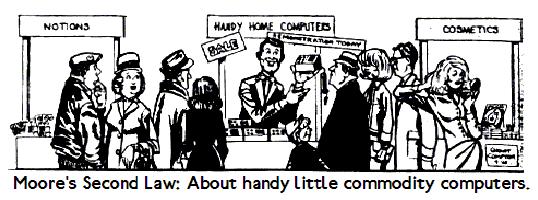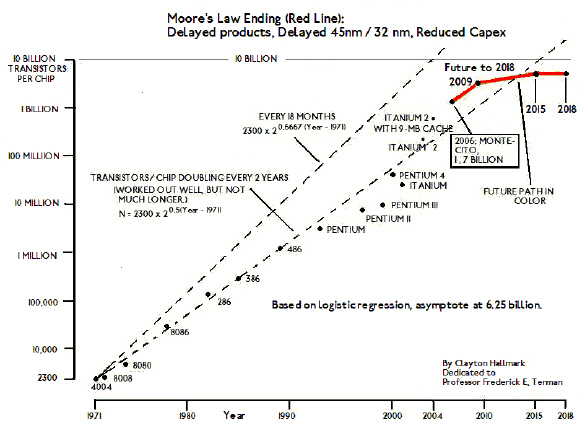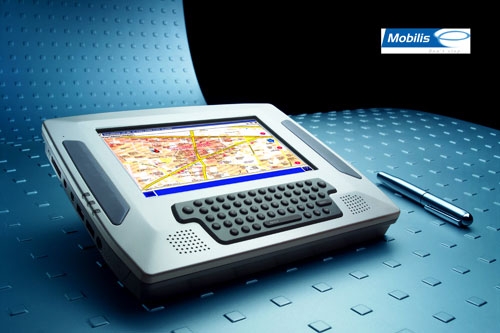Moore's-Law End Is Crisis for Econ.-ALSO $150 Computer Exposed
Paul Bizjak | 12.05.2006 04:29 | Globalisation | Technology

This cartoon was in Moore's famous article.

How Moore's Law probably will end (soon).

Mobilis computer from India is designed to be supercheap.
A whistleblower in the computer industry has written an article on all this. It is long, but the "sound" bites below give you the gist of it.
Sound Bites from Article
"Moore's Law ending -- $100 Computer coming, to U.S. too."
by Clayton Hallmark
"The article shows two related outcomes -- Moore's Law ending and $100 computers coming. It's as earthshaking as Peak Oil, economically and socially."
"Watch the news on Intel and Dell."
"The Chinese can have a $150 computer -- but you can't"
"Intel has bought and paid for its founder's (Moore's) law, making it a self-fulfilling prophecy. But not for much longer."
"PC history is about Intel's (Moore's) Law and Microsoft's lawlessness."
"$100-$200 computers are not just for developing countries, as Nicholas Negroponte of the MIT Media Lab thinks. 'How you gonna keep 'em down on the farm' in China once the American consumer sees them?" (Nick is the brother of US spy chief John.)
"Moore's Law's J-curve (showing doubling of transistors on a chip every year or two) will start looking like an S-curve next year (2007), starting to level out on top."
"It's so obvious. Moore predicted this also: Computers will be go the way of transistor radios -- book size or less, disposable, anywhere use. Their processor performance will be secondary. They will be made in Asia, not by Dell, with lots of hand labor."
"There are crazy people running around to conferences telling people we will have PCs with the computing power of the human brain. (Oh, no. The "electronic brain" is back. Does it meet the Turing Test yet?) Personally, I have a hard time matching wits with the electronics on a new car. And I once wrote a book about it."
"Cheap computers mean cheap, or free, software."
"Capital-spending cuts by Intel suggest Moore's Law is ending."
"Intel could chase the shrinking transistor to the vanishing point, of profits. But they won't."
"An under-$150 computer with DVD -- without Microsoft or Intel -- is available in 2006 in China (the Longmeng). Woe are Intel, Microsoft, and Dell."
"The transistor can't shrink many more years. What follows (spintronics, photonics, quantum devices) will not be electronic, not faster, not cheaper, and definitely not Moore's Law."
"Miniaturization has driven progress in electronics since radios were scaled down for strapped consumers in the Great Depression of the 1930s."
"Smaller-cheaper, or miniaturization-commoditization, is the Electronics Way."
"In electronics, the emphasis on smaller-cheaper will return for computers."
"With notebooks, there's less reason for continuing with Moore's Law and pushing more performance."
"Some don't want to admit this (no need for much more speed), and no one wants to admit to being an 'average' computer user."
"What I need is a small-cheap computer to carry on my infinite-gas-mileage bicycle. One I can just throw away if I break it."
"In the future, computer performance will be sacrificed for portability and power savings."
"In a world of shrinking resources and growing demand, products get made smaller and cheaper."
"Computer makers should preload free software for 99 percent of uses."
"A $100 computer will be a long time coming as long as a $70 operating system is involved."
"Microsoft is a publishing company that patents what should be copyrighted."
"In Korea, Taiwan, Vietnam, etc., ignoring monopoly patents is not piracy."
"Is piracy even possible against a monopoly?"
"Hardware trumps software -- economically, legally. Remember the VCR wars between Hollywood (publishers) and VCR makers (hardware)? Hardware won."
"It is hard to tell people how to use things (VCRs, computers) in the privacy of their own homes."
"Software prices have declined hardly at all since computers became transistorized."
"Diehr (the court ruling allowing software patents) makes computers 'dear.' India's Parliament prevents such rulings there."
"Microsoft's monopoly is enforced by 7000 minor patents. Can you name one? A company called Hazeltine once did the same thing with radios. Who remembers THEM now?"
"Harness the promise of technology without becoming slaves to technology." (President George W. Bush) "End slavery to Microsoft and Intel." (Me)
---------------------------------------------
"Moore's Law is just an example of the S-curve of natural growth that comes from biology (rabbit population growth)."
"Moore's Law of transistor doubling follows an S-curve, not a J-curve ever-upward as most think. There are only so many rabbits (new materials, new fab processes) Intel can pull out of its hat to overcome obstacles to Moore's Law."
"The hardest thing to forecast about technology is how people will use it. However, Moore's paper did also predict palm-sized, handy, super-cheap computers as a result of integrated circuits. Most people don't remember that part."
"It's products (computers, etc.) that need to be miniaturized further, not transistors."
"We need cheaper, not better."
"Future computer progress will come not from the likes of Intel but from computer makers, in Asia."
"Hedonic pricing (performance-adjusted pricing) is a 'cheapening trick."
"Moore's Law is not just about max transistors on a chip -- but MINIMUM COST PER TRANSISTOR. It's economics as well as science."
"Shrinking transistors start behaving like the old thermionic tubes. Thermionic emission: physically, that's what will stop Moore's Law."
"Future logic devices won't be faster or cheaper than CMOS (transistors) and might not even be general-purpose."
"The baton for PC progress is passing from the component makers like Intel to equipment makers -- in Asia."
"The first microcessor was made by Americans, for Japanese, to make smaller-cheaper calculators. Then Japanese manufacturers took over calculators."
"All we are waiting for is a manufacturer in Asia to make a $100 computer. (We're close.)"
"Computers have gotten cheaper as their guts have followed Moore's Law and their manufacture has followed other gadgets to Asia."
"Microsoft merely replaced Kildall's DOS with Windows copied from Xerox and Apple."
"'To promote the progress of science and useful arts....' (U.S. Constitution, on intellectual property.) Have Microsoft patents done that?"
"Could gunboat diplomacy assert Microsoft's rights against Asian 'pirates'?"
Paul Bizjak
Comments
Hide the following 5 comments
Last year, I bought a $150 computer with an Intel CPU
12.05.2006 16:02
$150 compter exposed??? I recently purchased, for well under that $150, a PDA (powered by Intel) that in EVERY respect is more powerful than my first 486 computer. I could go out tomorrow and buy a complete refurbished PC that represents state-of-the-art from not so long ago for that target price. I could BUILD a new PC today INCLUDING CRT monitor, for little more than that target price.
Open-source software provides access to all 'office' functions (eg., word processing), operating system, video and audio codecs etc.
Let me take a few more interesting points. Why didn't the Asians rule the PC marketplace from a design and brand position. Answer: BECAUSE ALL CREATIVITY IS BEATEN OUT OF ASIANS (USUALLY WITH A ***VERY*** BIG STICK) DURING THEIR EDUCATION. Asian society has massive flaws when it comes to individual freedom and thinking. The US culture was, and still is, essential, when it comes to free-thinking. The PC was birthed on all those things that made the US great (and very different from the rest of the World, where old people tend to rule over the young).
Anyone that thinks the balance is yet changing is a fool. Take the recent success of the iPod. MP3 players had been manufactured by a myriad of no-brand asian companies for years. The big asian brands (stymied by their historic connection to that BRAIN-DEAD european company Phillips- actually Royal Philips Electronics NV, where the 'royal' tells you everything you need to know) couldn't make progress from this format to save their lives (and Sony refused to even try). Along comes Apple, and their vastly unpleasant leader Jobs, and the music biz takes its first leap forward since the introduction of CD's.
Why do people outside the biz even use terms like 'Moore's Law'? Do they think it makes them seem clever? In reality, using buzz phrases like 'Peak oil', 'oil bourse', 'Moore's Law' etc simply makes one sound very, very ignorant (just the way Blair and his people like it).
To explain to the rest of you the concept behind 'Moore's Law'- the birth of the 'integrated circuit' meant that electronics moved from the wired connection of discrete parts (transistors, diodes, resistors, capacitors etc) to a manufacturing process remarkable like making a photograph, where a complete circuit would be created using chemical deposition on a substrate. The very use of photographic like methods allowed the early designers to predict that any given circuit could be made smaller and smaller as manufacturing methods improved.
Today, each complicated and insanely expensive collection of improvements goes by the general term of a 'process shrink'. The 'shrink' refers to an optical reduction in the size of the circuit, allowing either more complex circuits, or smaller circuits to be built on each wafer. Smaller tends to mean cheaper (once the 'research and development' costs, and 'tooling' costs have been paid for). However, other issues factor in as well, especially the amount of power used by the smaller circuit, the amount of heat generated by the circuit when in use, and the switching speeds of the transistors.
What do consumers require from a 'process shrink'? Faster chips? Cooler chips? Cheaper chips? Cleverer chips? Chips that use less power? The answer is far from simple, and products not yet invented by have very different requirements from those that are currently popular.
Take the aforementioned iPod. It wants low power (for long battery life) and cheap. Speed and clever are NOT issues. Thus the iPod has helped collapse the price of the type of memory it uses.
On the other hand a games PC or next-gen console wants faster and cleverer.
What does growth in the computer market-place represent (the assumed point of the dreadful article to which I am replying). In reality, this has come down to "why do ***I*** need a computer" and "how can I afford a computer". Price is important to a point, but then utility takes over.
Clearly there is a limit to the number of PC type computers one can theoretically sell on Planet Earth at any moment in time (just like with Cars, TV's or any other item). This consequence of exponential maths vs a finite marketplace is behind most idiot comment concerning 'Moore's Law'. No company can grow indefinitely with a fixed marketplace. When investors have ONLY been interested in a company because of its early growth, this fact is often exposed by the ignorant as proof that a given company is now declining. An inability to continually grow is NEVER proof of decline.
The truth about 'process shrink' is that it has given a reliable and 'dumb' burst to the computer biz every couple of years, allowing 'hardware' advances to run far in front of 'software' advances (or even 'design' advances). In biz, people will always take the easy option when available. One day (but further away than you may think) the 'shrink' option will end. However, past that date, advances in material sciences and circuit design will continue to give improvements in speed and power dissipation. BETTER, the price of the final process will decline and decline, as all focus will be on cost-reduction (just as you have seen with LCD displays for the last few years).
All this means that in the future we will have computers vastly more powerful than today for vastly lower prices. At some distant point in time, an equilibrium will be reached where the hardware at that point doesn't really get any cheaper. Guess what, guys? That happens with EVERY product.
The computer is unique though, for the hardware is the SMALLEST part of the equation. We have used only the most limited potential of our existing computers. Software takes far longer to produce than hardware, and so do new ideas in how existing hardware can be used. The Internet itself is a great example of this. Hardware advances put more of us online, at ever faster connection speeds. More processor speeds makes things like VM Java, and video streaming possible. Cheaper storage costs make Google possible. However, the Internet lives and breathes throught its 'software', both literal and as a word describing the creativity of net-users.
Childish bashing of Intel and Microsoft based on complete ignorance of the computer business is pathetic. As it so happens, at this moment Microsoft is stagnating because man has yet to learn how to manage massive software projects by simply throwing more resources at them. Intel, on the other hand, is coming out of a years long creativity slump, and is about to release a whole new family of excellent, cheap, fast, low power processors (and ***I*** am a long time AMD user).
Time has proven the importance of hardware monoliths like Nvidia, ATI, AMD and Intel to effectively handle the hyper-costs incurred when moving hardware design forward at the same time as making a profit. These companies did not cheat their way to success, but won by being right, when their competitors were very wrong.
Software is a very different issue. At this moment in time, the most evil of Human forces are attempting to make most software development illegal via 'software patents'. What is a 'software patent'. Well imagine you see someone making a door. You ask them 'what does it do'. As soon as they tell you, you rush to the patent office to get a patent on people opening doors by pulling on the doorknob. Now, every time someone opens a door, they have to PAY you.
Programming involves taking the OBVIOUS (things that the programmer actually discovers through the application of logical thinking) in order to build a software machine. Software patents allow individuals to OWN the obvious, so that no-one else may use these mechanisms. Another kind of software patent allow people to claim ownership of that which cannot yet be made, but would be obvious when hardware technology improves. Email over wireless is a good example. ZERO INVENTION, but doesn't become practical until the hardware exists in the right form. Imagine you were allowed to take a paent out on flying cars. No need to say how they work, of course, but when someone finally spends billions to manufacture them, you can claim ownership because you SAID it first.
Software creativity is also threatened by the short-term interests of the music, film, and TV industries. The people that run these drug and prostitution and corrupt pay-off fuelled companies don't care how much damage they do to the future of mankind, so long as the coke keeps flowing. The most disgusting and draconian laws have been passed in most nations of the world as a consequence of services provided by the leaders of these companies to the bent politicians they needed to influence.
Killing the creativity of the individual kills the creativity of the West. Without this advantage, other, larger populations, well educated but ruthlessly mind-controlled from cradle-to-grave, will take over.
ON THE OTHER HAND, think about this. We would NOT war with China in the future if OUR FREEDOM converted them to our viewpoint across time. The poisoning of the West by new laws and software patents is a VERY important part of Blair's strategy. Blair must strip all hope from our hearts to make war seem an inevitable obstacle that we must cross in order to progress.
If Blair's laws and software patents had been in place BEFORE the birth of home computing, and the PC and internet, NONE OF THESE THREE THINGS WOULD ***EVER*** HAVE EXISTED. It is only this fact that keeps certain industry thugs, that otherwise would enthusiastically embrace Blair's program, from doing so. Sadly, there are plenty of others who think only of the short term private financial gains, and would act identically even if given a time-machine, and allowed to witness the billions that will die when the strategy helps create war with China.
Today a man is about to be extradited to the US for connecting to US computers from his home in the UK. You will live to see UK citizens extradited to the US for daring to include obvious code in their projects patented by US companies. Blair needs our future to be a living nightmare, regardless of how we choose to live our life. We must constantly feel that Blair's boot is moments away from descending on our neck. People who talk crap about 'Moore's Law' and $150 computers help hasten this future.
twilight
You've forgotten something..
16.05.2006 10:15
sarcoptic
Moore's Law Ending --- End of Moore's Law
11.08.2006 18:31
About the $100 Computer: That is generally meant to mean one you can "touch type" on, assuming you have learned to do that, not just a Palm-type device (you have to hunt and peck or use a stylus), or a handheld, a used computer, a computer without applications, or anything else.
A $100 computer that takes the place of today's $1000 notebook is what is meant, and it is possible. Intel and AMD have provided the chips; now it is up to computer makers in Asia.
Bob Prechter
 e-mail:
rprechter5@yahoo.com
e-mail:
rprechter5@yahoo.com
 Homepage:
http://home.earthlink.net/~moores-law/
Homepage:
http://home.earthlink.net/~moores-law/
See new "End of Moore's Law dot-com" new dedicated site on topic
23.08.2006 19:02
http://www.endofmooreslaw.com shows computer hardware and economic trends.
This will reverse: quality stabilizing, prices plummeting
It takes not only a narrow technical view, but goes beyond that to consider this in the larger and longer context of all of electronics, going back to the old-time radios.
Moore's Law is just part of this, and it is leveling out, as even Mr. Gordon Moore admits.
Tom Ryun
SEE http://home.earthlink.net/~moores-law/ FOR FULL ARTICLE
18.10.2006 04:07
THIS IS A MUST-SEE.
Clayton Hallmark
 e-mail:
hallmark_cl@earthlink.net
e-mail:
hallmark_cl@earthlink.net
 Homepage:
http://home.earthlink.net/~moores-law/
Homepage:
http://home.earthlink.net/~moores-law/